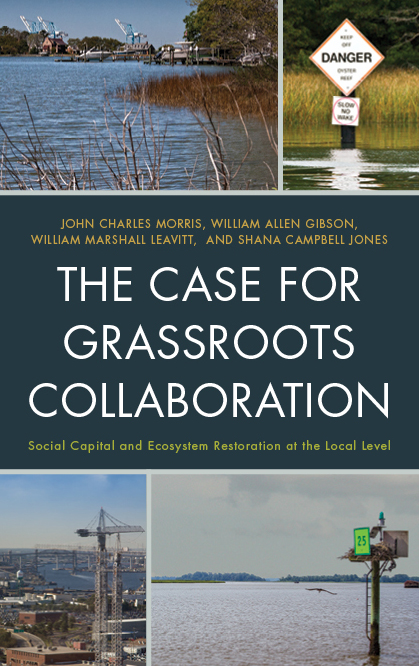ODU Faculty Members Are Co-Authors of Book About Grassroots Efforts to Restore Chesapeake Bay
December 12, 2013

Two Old Dominion University faculty members have joined forces with scholars with their own ODU connections for a book that examines community efforts to encourage conservation strategies in the Chesapeake Bay watershed.
"The Case for Grassroots Collaboration: Social Capital and Ecosystem Restoration at the Local Level" was published in November by Lexington Books.
The book is authored by John Morris, professor of public administration, and Bill Leavitt, associate professor of public administration, in ODU's Department of Urban Studies and Public Administration. The two teamed up with William Gibson, Batten Professor of political science at Virginia Wesleyan College (a former ODU faculty member), and Shana Jones, an environmental lawyer and director of the Virginia Coastal Policy Clinic at the College of William and Mary Law School (a former adjunct faculty member at ODU).
The book suggests the nation is at a crossroads in how to solve environmental and sustainability issues, and looks to the communities that ring tributaries of the Chesapeake Bay for local solutions that can help address the wider issue.
"Pollution is not a local problem, or a state problem; at the very least, it is a national problem," Jeff Corbin, senior adviser for the Chesapeake Bay and Anacostia River for the U.S. Environmental Protection Agency, writes in a foreword for the book. "Controlling pollution starts where it begins: at the local level."
The authors use the grassroots efforts by Hampton Roads-based organizations on various waterways of the Chesapeake Bay as a case study in what works at the community advocacy level for a truly national problem like pollution. The organizations include the Elizabeth River Project, Lynnhaven River NOW and the Nansemond River Preservation Alliance.
The book takes a fresh look at efforts to address pollution in the Chesapeake Bay watershed, home to 17 million people in six states and the District of Columbia. Despite innovative programs around the region, the Chesapeake Bay restoration goals have not yet been reached.
"The Case for Grassroots Collaboration" speaks to the collective mobilization of citizens in communities to address water quality issues in their local area, bolstering regional and national efforts. The work of concerned citizens groups that leads to water quality successes in tributaries contributes positively to water quality in Chesapeake Bay.
The authors conclude that social capital plays a large role in determining the success of these local organizations. More importantly, such groups can have significant impact on the quality of the watersheds in which they operate.
The book will soon be accompanied by a website, http://watershedrestorationhr.org, which will contain photos from the different rivers that served as case studies for the research; photos of some of the people involved in the organizations; links to related sites and to the book; some text about the organizations and the book project; author biographies; and other content.

